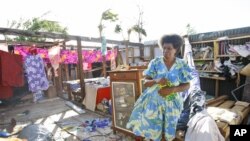Authorities in Vanuatu are warning of imminent food and water shortages after the South Pacific nation was hit by category five Cyclone Pam on March 13. Eleven people are confirmed to have died in the tropical storm, and tens of thousands were left homeless.
Vanuatu's long-term recovery from Cyclone Pam will be discussed Wednesday at a meeting led by the United Nations in Port Vila, the capital.
The U.N. has made an urgent appeal for $23 million to provide life-saving assistance, including food, water, health care and shelter.
On the island of Nguna, village chief Donald Manamena said many residents have been left with nothing.
“This is probably the worst cyclone that I have experienced and I have seen. I would say that this is the first cyclone of this climate change that much talk has been going around about. We will need outside help; water and food. People will need something to start rebuilding again. There is nothing on the land right now that people can earn money from,” said Manamena.
Nguna is home to 1,000 people. Their main source of income - fruit and vegetables grown in rich volcanic soil - has been destroyed, along with many homes.
John, a father of four, is among those hard hit.
“No more water now… I am worried about the sickness - the children, all the children,” he said.
The United Nations said there is a "significant risk of disease" across Vanuatu due to water shortages, limited medical care and poor sanitation.
But despite the widespread problems, there is great resilience here, said one female villager.
“In the meantime we have to look after ourselves, our families, so we just be careful that nobody get sick,” she said.
Australia and New Zealand have been at the forefront of the international aid effort, while Britain and France, Vanuatu’s former colonial rulers, have also been heavily involved.
New Zealand High Commissioner Georgina Roberts praised the islanders’ ability to help themselves in such dire circumstances.
“The devastation is immense but the ability of the people here to bounce back and to step forward and try and start picking up and clearing up is fantastic,” said Roberts.
Vanuatu’s Prime Minister Joe Natuman said it could take several years for the South Pacific island chain to fully recover from one of the most powerful cyclones the region has ever seen.
“Right now shelter is very important; shelter, water, medicine for people to start rebuilding their lives, and then we will start the reconstruction phase. It will take years for us to recover,” he said.
The economy relies heavily on tourism and agriculture. Both sectors have been hard hit, but the authorities promise that although a paradise had been lost, Vanuatu, an archipelago that is home to more than 250,000 people, will eventually recover.




